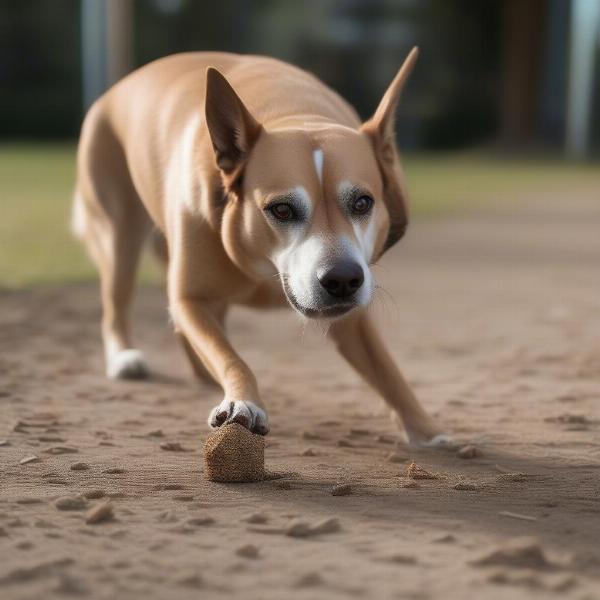Laser pointers can be a fun way to play with your dog, but excessive use can lead to Laser Pointer Syndrome, a behavioral obsession. This can manifest as compulsive chasing of light and shadows, frustration, and even anxiety. If your dog is exhibiting these behaviors, it’s time to address the issue and help them break free from this unhealthy fixation.
Understanding Laser Pointer Syndrome in Dogs
Laser Pointer Syndrome, while not a clinically recognized medical condition, is a well-known behavioral problem. It stems from the dog’s natural prey drive. The elusive, fast-moving red dot triggers their instinct to chase, but unlike other toys, they can never “catch” it, leading to frustration and an obsessive pursuit of light and reflections. This can extend to shadows, reflections on walls, and even dust particles, significantly impacting their well-being.
Breaking the Cycle: Strategies to Reverse Laser Pointer Syndrome
Thankfully, you can help your dog overcome this obsessive behavior. It requires patience, consistency, and a shift in playtime strategies. Here are some effective methods:
-
Introduce “Catchable” Toys: Replace the laser pointer with toys your dog can physically interact with. Plush toys, balls, ropes, and puzzle toys provide a satisfying sense of accomplishment when caught.
-
Predictable Play Patterns: Establish predictable play patterns with these new toys. Throw them in a consistent manner, allowing your dog to anticipate their trajectory and experience the reward of a successful catch.
-
Short and Sweet Play Sessions: Keep play sessions short and focused. This prevents the build-up of frustration and reinforces the positive experience of playing with tangible toys.
-
Positive Reinforcement: Reward your dog with praise and treats when they engage with physical toys, further reinforcing the desired behavior.
Redirecting Your Dog’s Focus: Alternative Enrichment Activities
Beyond toys, enriching your dog’s environment with alternative activities can help redirect their focus away from light chasing.
-
Scent Work: Engage your dog’s powerful sense of smell with scent work games. Hide treats or toys around the house and let them sniff them out. This mentally stimulating activity provides a healthy outlet for their natural instincts.
-
Training and Obedience: Regular training sessions not only reinforce basic commands but also provide mental stimulation and strengthen the bond between you and your dog.
-
Physical Exercise: Adequate physical exercise is crucial for managing frustration and pent-up energy. Daily walks, runs, or playtime in the park can significantly improve your dog’s overall well-being.
 Dog Engaged in Scent Work
Dog Engaged in Scent Work
When to Seek Professional Help
If your dog’s laser pointer obsession is severe or you’re struggling to manage it on your own, consult a certified professional dog trainer or a veterinary behaviorist. They can provide personalized guidance and develop a tailored behavior modification plan.
Conclusion
Reversing Laser Pointer Syndrome requires patience and understanding. By replacing the laser pointer with tangible toys, establishing predictable play patterns, and enriching your dog’s environment, you can help them break free from this obsessive behavior and enjoy healthy, fulfilling playtime. Remember, a balanced and engaging lifestyle is key to a happy and well-adjusted dog.
FAQ
-
How long does it take to reverse Laser Pointer Syndrome? The time varies depending on the severity of the obsession and the dog’s individual temperament. It can take weeks or even months of consistent effort.
-
Can I ever use a laser pointer again? It’s best to avoid laser pointers altogether to prevent relapse.
-
What are signs of Laser Pointer Syndrome? Signs include obsessive chasing of light and shadows, frustration, whining, barking, and anxiety.
-
Is Laser Pointer Syndrome harmful? While not physically harmful, it can lead to significant stress, anxiety, and behavioral issues.
-
Are certain breeds more prone to Laser Pointer Syndrome? Any breed can develop this obsession, but dogs with a high prey drive may be more susceptible.
-
What if my dog ignores other toys? Try different types of toys, textures, and scents to find something that sparks their interest.
-
Should I punish my dog for chasing light? Punishment is never effective and can worsen the problem. Focus on positive reinforcement and redirection.
ILM Dog is a leading international dog website dedicated to providing expert advice and resources on all aspects of dog care and wellbeing. We offer comprehensive information on dog breeds, health, training, nutrition, grooming, and much more. From puppy care to senior dog care, we cover everything you need to know to be the best dog owner you can be. We also offer a wide range of products and accessories to help you care for your furry friend. For expert advice tailored to your dog’s specific needs, contact our team at [email protected] or call us at +44 20-3965-8624. ILM Dog is your trusted source for all things dog related.